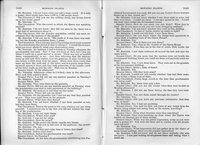1048-1049
| Previous Page | Next Page |

|
Mr. Reeder. I do not know what you call a large crowd. It is only a guess; there might have been 1,200 to 1,300 people there.
The Chairman. Did you see any military array, any troops drawn up in line under arms?
Mr. Reeder. No.
The Chairman. Was the crowd to which the Queen was speaking excited?
Mr. Reeder. I do not know; they did not seem to be; there was a good deal of earnestness about it.
The Chairman. Did the Kanaka population exhibit any more excitement than the balance of the people?
Mr. Reeder. I did not see it. The truth of it was there was nothing but the Kanaka population there, I guess.
The Chairman. Have you any special knowledge about what occurred in Honolulu during the period of that revolution? I would like to know what you know about it; what your observations were.
Mr. Reeder. At between 2 and 3 o'clock on Tuesday afternoon the proclamation was read. Now I was not there at that, but I was out where I could see a good deal of a crowd. There was only a handful there, comparatively, to me. And then following that the marines came up and took their station near the premises, or near, between the two houses a little away from the gates. There were three roads that came up from the west end of the town, and is a pretty large three-cornered square, is there, and they took possession of the square-each of the three roads up into the city. That was on Monday.
Senator Gray. In the afternoon?
Mr. Reeder. Afternoon-close to 5 o'clock-late in the afternoon. They took their position there.
Senator Frye. You did not see any marines paraded on Tuesday?
Mr. Reeder. Tuesday?
Senator Frye. Yes.
Mr. Reeder. They were there on the grounds.
Senator Frye. Did you see any marines paraded on Tuesday when the proclamation was read to take possession of the building?
Mr. Reeder. My memory is not clear on that point.
Senator Frye. Where did you see them?
Mr. Reeder. On the grounds; but I can not say that they paraded or not. They were right there on the grounds.
Senator Frye. What were they doing?
Mr. Reeder. I do not know whether I saw them paraded or not; but they were there.
The Chairman. That is the point in the case, whether you saw them paraded. I understood you to say that you did not witness the reading of the proclamation.
Mr. Reeder. I was not right there.
The Chairman. Where were you?
Mr. Reeder. I was not far away.
The Chairman. How far away?
Mr. Reeder. Right across the block-maybe two blocks.
The Chairman. Were you in full view of the audience-the crowd?
Mr. Reeder. Oh, yes.
The Chairman. At that particular time or before that time?
Mr. Reeder. Before what time?
The Chairman. Before the proclamation was read?
Senator Gray. On Tuesday?
The Chairman. At the time the proclamation establishing this Provisional
|
Government was read, did you see any United States marines drawn up in line, armed, etc?
Mr. Reeder. I do not know whether I saw them right in arms, but they were there. I could see them. I was up a square or two. I could see them there before the Government house.
Senator Frye. How do you mean you saw them? Were they in line? Or do you mean to say you saw some straggling soldiers?
Mr. Reeder. I do not know whether they were in line, drilling.
The Chairman. In line of battle, drawn up ready to fight?
Mr. Reeder. I could not tell that; I saw them there.
Senator Gray. Do you know where the troops were quartered, in Arion Hall, a building back of the Opera House?
Mr. Reeder. Yes.
Senator Gray. Was it there you saw them?
Mr. Reeder. Yes; close in the vicinity of the Opera House.
Senator Gray. Were they not in the rear of Arion Hall, inside the fence?
Mr. Reeder. I saw them scattered all around the hall and near the opera house.
Senator Gray. Do you mean that the marines were out beside the Government building, where you could see them and anybody could see them?
Mr. Reeder. Yes; I saw them there. They were not in the grounds of the Government building.
Senator Gray. Quite a body of them?
Mr. Reeder. Yes.
Senator Gray. Did they have arms?
Mr. Reeder. I could not tell exactly whether they had their arms. I was within a block or so of them.
The Chairman. Pretty large crowd at the time that proclamation was being read?
Mr. Reeder. No; there were only a few.
Senator Gray. Did you see the troops when they were landed on Monday afternoon?
Mr. Reeder. I did not see them during the time they were landing; no.
Senator Gray. You saw them march through the streets?
Mr. Reeder. Yes.
Senator Gray. Did you have any previous information that they were to land?
Mr. Reeder. No; I had not anything.
Senator Gray. You said the first you knew of any troops from the Boston being ashore was seeing them on the streets, marching?
Mr. Reeder. Yes.
Senator Gray. From what direction were they marching?
Mr. Reeder. They were marching up from where the Boston was landed, up through one of those streets.
Senator Gray. What was the public impression, so far as you were able to gather it? You were out there and in contact with the people, were you not?
Mr. Reeder. Yes.
Senator Gray. What impression did you gather as to the object of those troops landing; what was the popular impression?
Mr. Reeder. I did not know and do not know anybody else who did know. I was just waiting developments there and seeing what I could see.
| Previous Page | Next Page |